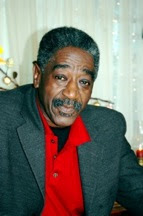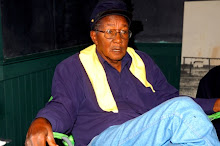I first met Yuri Kochiyama in the year of 2003 while working on a book project. She was living in a small, one-room apartment in Oakland, California. Her living quarters were not what one would call spacious, but the world which she inhabited went well beyond the walls of this environment. She was 81 at the time, a fragile body, supporting a hundred pound frame inhabited by the spirit of a lion. The walls of her room were peppered with pictures of her Japanese and mixed-race grandchildren.
Our first meeting, scheduled for a week earlier, had been postponed because, as explained to me later, she was to take part in candlelight vigil for a California man on death row. She was a vocal opponent of the death penalty, and keenly aware that many of those waiting to walk that proverbial last mile were there because they couldn't afford the kind of representation that would get them a lighter sentence, or, they shouldn't have been there in the first place.
Yuri had first-hand experience with unlawful and forced incarceration. At the age of twenty, she and her family had been swept-up and forced to abandon their home in San Pedro, California, following the Japanese bombing of Pearl Harbor. Because her father was in the fishing business and had a friend who occasionally visited from Japan, he was immediately arrested. He suffered from ulcers and was sent to San Pedro Hospital which was also the facility where wounded soldiers from Wake island were hospitalized. A sheet was tied around his bed with the words "Prisoner of War" written on it, making him a target, if not of physical attack, certainly verbal. Within a few days he was released and sent home where he died the next day. Shortly afterward, Yuri and her family were sent to an internment camp near Little Rock, Arkansas.
Because she was young and pretty, Yuri was given the option of working at a USO club at Camp Shelby, Mississippi. There, the all-Japanese unit of the 442nd Infantry Regiment was going through basic training. She met a young man who would later become her husband. In Mississippi, both she and her husband-to-be witnessed the forced segregation and Jim Crow laws that Blacks experienced both in war and peace time. Blacks and Japanese were inducted into the same army, but from the beginning, the Japanese were allowed to fight if not in the same units, alongside white soldiers. Not so for Blacks. The officers were white for both the Japanese and Black units. The 442nd became one of the most highly decorated units ever to serve in the military. In the air, the Tuskegee Airmen won their honors. And because of the exploits of Japanese and Black fighting men, President Truman eventually desegregated the Armed Forces.
After the War, Yuri and her husband moved to Manhattan in New York. As the family started to grow and the years passed, they settled in Harlem. There Yuri and her husband came under the influence of Malcolm X. "Before Malcolm I was a Civil Rights worker," she said, as she fumbled around in a box near her bed. "After I met him I became revolutionary." This marked the beginning of her career as a political activist that would continued for years to come. He husband worked and supported her until his dying day.
"I often went to hear Malcolm speak, and also invited him to our home where he met some of our friends. We exchanged letters, and he sent me cards from his travels to the Middle East and Mecca," her hands now filled with the items of which she spoke.
Her passion for justice and equality was passed on to her children, two of whom, upon graduation from high school, went South to work on the voter registration drive for Blacks.
On February 21, 1965, Yuri went to the Audubon Ballroom in Harlem to hear Malcolm speak. She remembered him appearing a little anxious, and then, like an explosion, the shots. Stepping over fallen chairs, she made her way to the front where her champion was sprawled in a pool of blood. "I got down and put Malcolm's head in my lap, until his wife, Betty Shabazz came."
As she remembered, while holding his head, he didn't say anything. "He was just trying to breathe; he was having a hard time breathing." She wasn't quite sure, but she either thought or said, "please Malcolm, live!"
I didn't see Yuri again for a year or so. It was in Little Rock, Arkansas where I was working on a project called "Voices of Civil Rights," sponsored by AARP, (American Association of Retired People). We set up shop at a local hotel where residents were invited to come and tell their stories relating to the Civil Rights movement. In that same hotel were hundreds of Japanese attending a conference dealing with the internment of Japanese Americans at the former camp near by. I wandered into one of the conference rooms where, to my great surprise, Yuri was speaking. I made my way to the edge of the stage to take some pictures. Yuri looked down at me and acknowledged my presence to the audience. We can't all be a hero, but it's my honor to be a friend of one.
Tuesday, March 10, 2009
Subscribe to:
Post Comments (Atom)








No comments:
Post a Comment